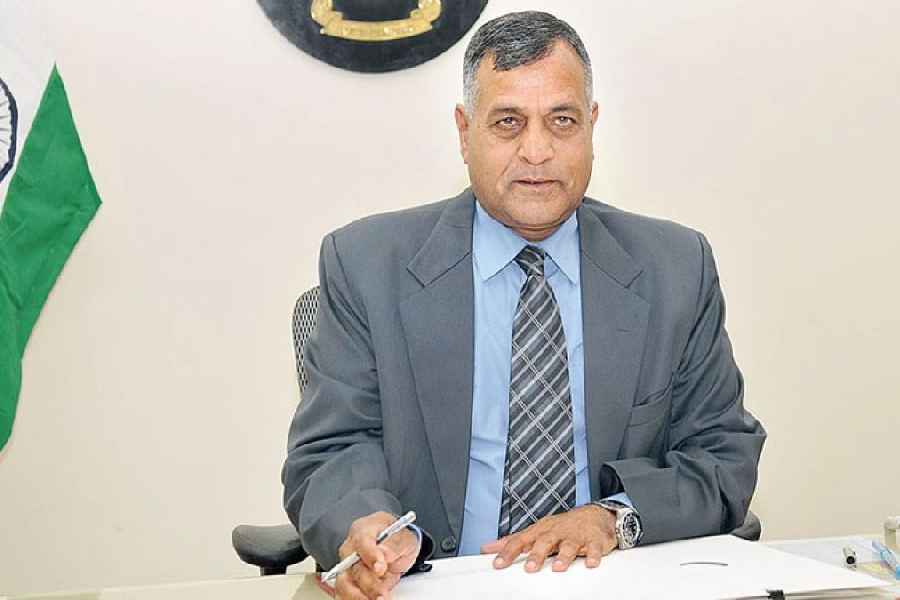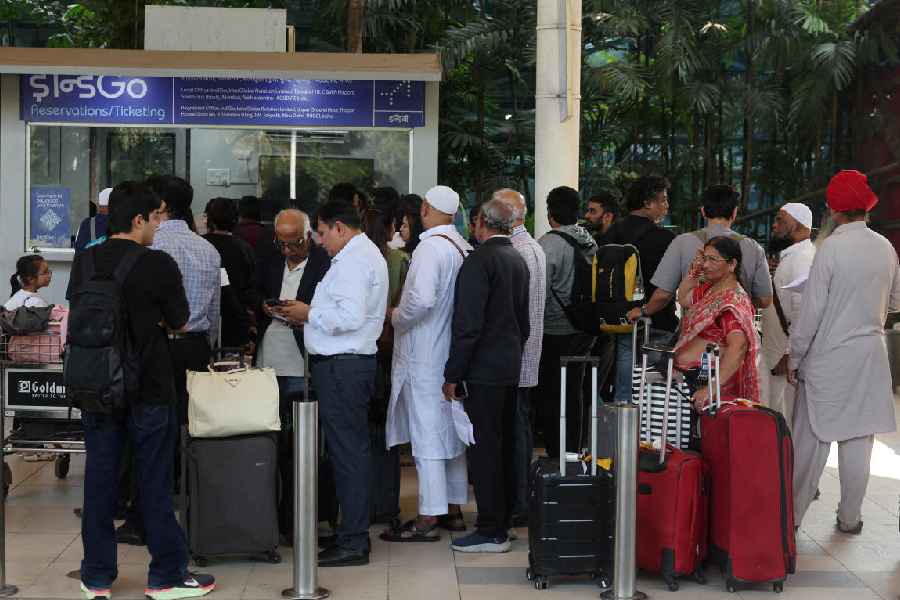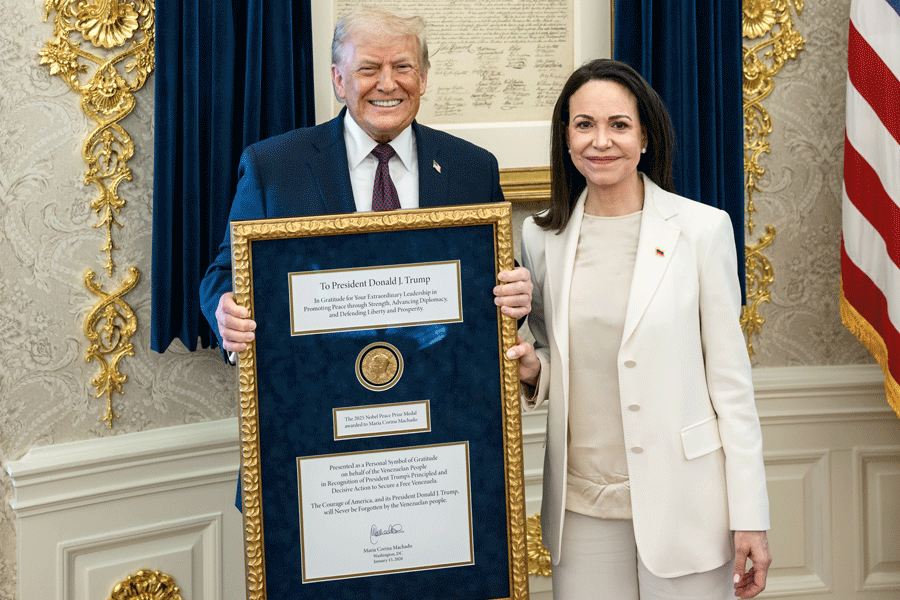 |
Making himself comfortable on the red sofa in his elder brother?s elaborately decorated living room in the Rajgarh area of Guwahati, Samarendra Narayan Dev, the National Award-winning filmmaker, immediately starts talking about his forthcoming project.
?I have just come back from Fancy Bazar after purchasing props and other properties for the shooting schedule of my new serial,? he smiles, wiping the sweat from his brow. The 62-year-old veteran is still robust and active. Without showing any signs of fatigue, he adds: ?Within two hours I?ll go back to Mangaldoi, my hometown, as a whole lot of things has to be arranged for the shooting.?
The Mangaldoi-based director has decided to use the vast expanse of idle land in his compound as a site for shooting his serial Naye Raah. The 13-episode serial, for Doordarshan, will be in Hindi. The director himself has penned the story and the script and the music is by the very talented and innovative music director Rupam Talukdar.
?The 30-day shooting schedule will begin on April 26,? he explains. To that he adds, ?By and large the cast is almost ready, except for a few actors whom I?ll talk to in the next few days.?
Based on contemporary social mores, the serial will explore the emotions and traumatic experiences of a younger generation trapped in myriad problems and confused regarding the values of life and living.
He has always been inclined towards the good and beautiful things in life. Since his childhood, the filmmaker has developed a passion for good theatre.
?Bhabananda Rajkhowa, the noted poet, was my schoolteacher. He almost hypnotised me with his lectures in the classroom. And though I could not become a poet, I went through the best of contemporary drama and started to write my own plays. These, in turn, I would direct,? he recalls. Even after many years, the director nurtures great reverence and gratitude for his idol, whom he calls his first and last guru.
?At every step of our life, we pick up and learn things from different individuals. Whatever we achieve is actually the sum of contributions of many a hidden persona, to all of whom we hardly pay due credit,? he muses. ?I cannot name all the people who supported my dreams, yet I must mention two names ? Rajkhowa Sir, of course, and the pioneer of Assamese theatre, Phani Sarma. They provided me with constant inspiration and gave me their blessings. That is why I have been able to build my career in the film industry.?
His film career, spanning some three-and-a-half decades, has also brought laurels and recognition to Assam. His first independent celluloid depiction, Aranya (1971), was based on the dwindling rhinoceros population in Assam. It brought him the National Award in the best feature film category (regional) in 1971.
His very next project, Putola Ghar, also wove the same celluloid magic. The subtlety with which he depicted the loneliness of a brother-sister duo trapped in a palatial building brought out wonderfully the hollowness in the lives of the rich in a capitalist society.
The film was also honoured with the National Award in the best feature film category (regional) in 1977. His next three ventures, Sonor Horin, Kazirangar Kahani and Raja were also widely welcomed by the audience. Critics, too, agreed with his idea of bringing socially relevant issues in a popular format, where music and dance are an integral part of cinema and help take forward the storyline.
?Since 1984, I have not made any films, owing to some personal reasons. But at present, I am ready with two scripts and will translate them into celluloid as soon as possible,? he promises. ?Films are food for my soul and without them, my existence becomes less meaningful.?
During all these years, he has made several documentary films, along with 10 telefilms and teleserials. His telefilm Dawor, adapted from Jogesh Das?s much talked-about novel Dawor Aru Nai, has the big names of the country?s television industry. It is his most cherished project till date.
?All my work owes its origin to my grooming in theatre and my experience in Calcutta, where I had the opportunity to learn the lessons of filmmaking from cinematographer Ramananda Sengupta,? he explains.
Dev?s major contribution to Assamese theatre lies in introducing Assamese audiences to the ?theatre of the absurd? through his award-winning play Viksha. In 1968, the play went on to win several awards, including the best director award at Asom Natya Sanmilan.
Till now, he has penned more than 10 plays. He has directed most of them as well. ?Life is definitely not easy and one has to strive hard to achieve excellence,? he points out. To that he adds, ?Art is no exception. Unless and until one comes up with the best and original inputs, no one bothers to come and watch your creation, forget about appreciating it.?
Talking about the crumbling Assamese film industry, the filmmaker has a new approach to the entire issue. ?Let us look into the matter holistically,? he stresses. ?Last year, in the entire country, a total of 1,000 theatre halls were closed down. Cinema, as a business, is showing a downward trend. So they are now coming up with multliplexes, where a small budget film with a good storyline is screened for a niche audience. That is, indeed, doing the trick; neither the audience nor the filmmakers are complaining.?
Dev suggests a similar sort of remedy for Assamese films. Instead of copying a Hindi film in toto, the filmmaker should come up with original ideas and execute them brilliantly.
?I don?t think that there is a dearth of ideas, it is just that we need to welcome good and unique ideas with the power to experiment with different issues. Ignoring militant diktats and other restrictions, audiences will throng the cinema halls in Assam too, I?m sure,? he smiles.
The dedicated filmmaker makes it a point to watch at least two films a day when he is not working.
?The best way to learn the art of filmmaking is to watch as many movies as you can. There is nothing like learning on our own. Here you are your own teacher and you are your own audience, so you have ample scope to strive towards excellence. This is what I believe, but I have no intention of imposing it upon others.?











